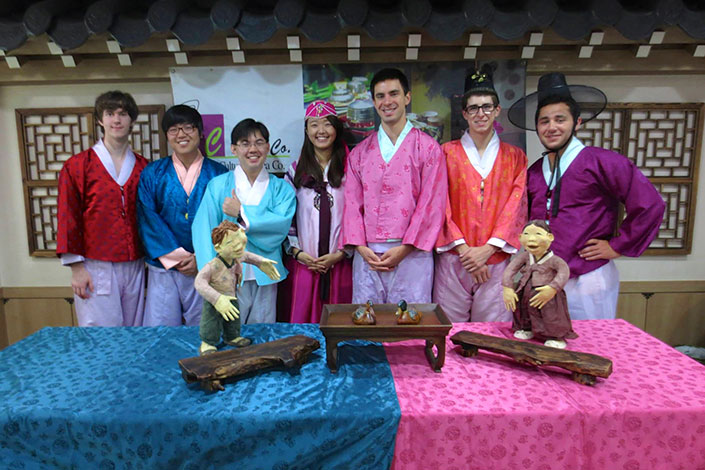As Willie Nuckols clicked through his inbox last winter, he ran across an email sent to engineering students about an opportunity to intern with Samsung, one of the world’s biggest names in consumer electronics. Unlike many technology opportunities, this internship wasn’t based in Silicon Valley, or D.C. – but on the other side of the world in Seoul, South Korea, in partnership with the University of Virginia’s new Global Internship Program.
As a first-year student planning to major in computer engineering, he had been applying for a ton of internships and assumed he’d be staying close to his Northern Virginia home. But with nothing to lose, he applied for the Samsung position, and soon received confirmation that he’d been accepted in the six-week internship program – the first time Samsung had partnered with U.Va.
“My parents didn’t know until I got in, and I called them that day and said I had an opportunity with Samsung, and it’s in Korea,” he laughed. “They were pretty surprised.”
U.Va. Global Internships develops relationships with businesses, governmental and non-governmental organizations, and U.Va. alumni networks abroad to provide students with valuable internship experiences. Recognizing that tomorrow’s workforce will learn and work in a global, multicultural environment, the office strives to offer a range of opportunities for students interested in building their resumes while spending time abroad.
Nuckols joined then-first-year computer engineering student Mike Verdicchio and second-year systems engineering and economics student Jordan Kohn and seven other U.Va. students on the journey to South Korea.
The massive 400-acre Samsung campus hosted hundreds of interns that summer, but the U.Va. students were the only Americans. Most of their Korean supervisors knew English – one mentor had received his Ph.D. in Arizona – and the students quickly picked up a few Korean phrases.
Samsung placed interns in project groups, and within that group the interns were matched with mentors based on their majors and interests. Nuckols and Verdicchio were assigned to the same small group, where they worked on a micro-processor design for a new phone, while Kohn integrated his systems engineering studies into product research.
The students spent lunches and dinners with their team, and they soon got to know their mentors and other Korean interns. Three of the seven U.Va. students were Korean or Korean-American, which helped bridge the language gap, Nuckols said. The U.Va. students caught on to the business customs in Korea – small gestures, like bowing instead of shaking hands, waiting for your superior to sit or rise before you do, passing objects to superiors with both hands and always brushing your teeth after lunch.
“There’s a really big hierarchy where with age, you get higher up, and social status definitely intermingles with business status,” Verdicchio said.
The company’s elite status in the tech world meant high security protects everything that goes on inside the “Digital City,” Kohn said. Employees must place stickers over their phone cameras, and all the company’s paper is embedded with microchips that would trigger alarms if employees tried to take documents out of the building.
“It also meant you don’t ever do work at home, which was kind of cool,” he added.
None of the students on the trip had studied abroad previously. For them, interning abroad was an opportunity to develop on a professional level, plus an adventure in cultural immersion and understanding, Kohn said.
The students spent weekends traveling around Seoul and hiking in the countryside. Toward the start of the program, one of their supervisors took them on a weekend cultural field trip to a market and to a cultural center, where they cooked Korean seafood pancakes, tried on traditional clothing and took in a concert that they compared to watching the American group “Stomp.”
The three undergraduate students noted that as future engineers, the opportunity to gain work experience, go abroad and intern for a company like Samsung was amazing. The students were paid and received a stipend for travel expenses, and they all agreed that they would do it again in a heartbeat.
“Since we’re engineers, it’s a lot harder to find a study-abroad program that fits into the U.Va. requirements, but being able to intern abroad was definitely a once-in-a-lifetime opportunity,” Nuckols said. “It's a great experience, you get to travel [and] the international experience plus job skills are great to put on a resume.”
His advice to students? “Just apply!”
The Global Internship Program office is in the process of confirming a new cohort of engineers for next summer’s Samsung program. New this year are a variety of internship opportunities in India, Turkey, Tunisia, Cameroon, the United Arab Emirates and Japan. The program also offers internships in Argentina, Australia, Belgium, Brazil, Canada, China, France, Germany, Singapore and the United Kingdom.
For a list of internship opportunities available this summer, visit globalinternships.virginia.edu and contact the U.Va. Global Internship Program Office.
Media Contact
Article Information
December 9, 2014
/content/south-korean-sojourn-offers-engineers-valuable-internship-experience

